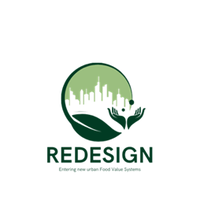REDESIGN
tRansformativE fooD valuE Systems reshapInG resilient urban laNdscapes

Coordinator: DISTAL
Scientific Officer: Francesco Orsini
Duration: 01/02/2025 - 31/01/2028
Research group: Francesco Orsini, Michele D’Ostuni, Giorgio Prosdocimi Gianquinto, Alessandro Pistillo, Giovanni Bazzocchi.
REDESIGN will support the transformation of local urban food systems by creating Food Value Systems (FVS). FVSs aim to strengthen urban resilience through food-led green urban and peri-urban infrastructure enhancement, foster participation in the food system of local communities (with a particular focus on vulnerable groups), contribute to the quality and beauty of living places, and mitigate climate change through the integration of urban agriculture with the built environment. The FVSs will operate through the development and application of a “Learning Loop” methodology grounded on NEB values to accelerate innovation in all the steps of the food system (including production, consumption, exchange, and disposal) and expand beyond the notion of ‘food chain’ to integrate the cultural, social and political dimensions of the transformation. To do so, it will feed on a newly created network which will consist of three main groups of actors: ‘observation’ cases, ‘implementation’ cases, and a board of cities. Observation cases exemplify consolidated best practices. In the pilots, the REDESIGN Food Value Network will be set up and implemented with the involvement of local stakeholders, particularly vulnerable groups. Furthermore, each implementation case will have a specific focus on one of the domains of the urban food system (nutrient recovery and food production, the setting up of a multifunctional food lab, and food policy councils). The implementation cases will then become Living Labs, through which the innovation in local food value networks will scale up at two levels: the metropolitan one, contaminating nearby districts through training and transfer, and the international one, enhancing the observation cases (closing the ‘learning loop’), and informing the board of cities for policy innovation and learning. Results will include regenerated neighborhoods in the implementation cases, the setting of three Living Labs steering the Food Value Network, a Learning Loop methodology, all scalable and replicable in other contexts.